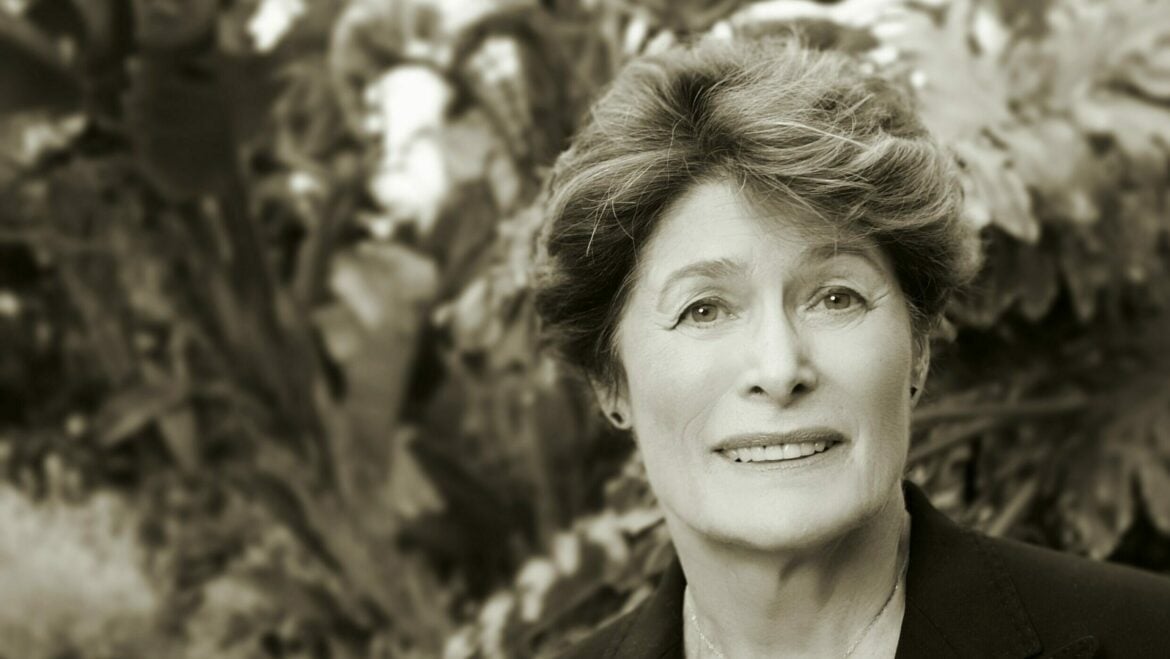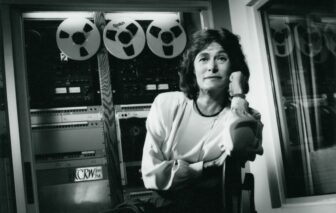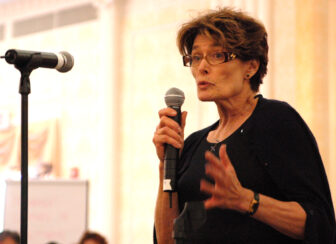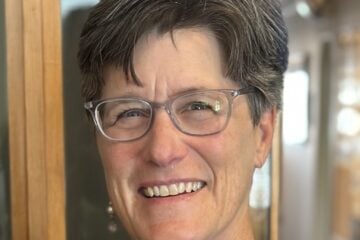Ruth Seymour, KCRW manager who shaped the sound of public radio from Santa Monica, dies at 88

Marc Goldstein
Ruth Seymour, prior to her 2010 retirement as KCRW's GM.
Ruth Seymour, an influential and brash station manager who transformed KCRW in Santa Monica, Calif., into a major creative force in Los Angeles and beyond, died Friday at the age of 88 after a long illness.
Seymour began her radio career in 1961 at Pacifica’s KPFK in Los Angeles but built her reputation for groundbreaking sensibilities as an innovative programmer and talent scout as GM of KCRW.
Under her leadership from 1977 to 2010, the college radio station became the NPR station for Los Angeles while also airing genre-defying contemporary music programs such as Morning Becomes Eclectic. Her focus on identifying and supporting new talent extended nationally to shows such as the short-lived Heat and the enduring This American Life.
Seymour also was a key player in campaigns to expand NPR’s news operations and later helped blaze trails for public radio to reach new listeners through digital platforms.
“Ruth could be mercurial and … difficult, but without a doubt she was a complete visionary,” said Sarah Spitz, a former KCRW producer and publicity director who worked with Seymour for 27 years. She praised Seymour for turning the station into a beacon of engaging, essential programming, adding, “We will not see it, or her likes, again.”
At national meetings, “Ruth would step up to the mic at a public session and berate all of us for being too timid, for not taking chances, for not living up to the spirit of public radio,” said Jay Kernis, a producer for CBS Sunday Morning who previously worked at NPR as senior producer of Morning Edition and VP of programming.
“Ruth could be really fierce,” agreed Jennifer Ferro, who succeeded Seymour as GM in 2010 and now chairs NPR’s board of directors.
“When Ruth had a feeling or a point of view, she could argue to the death,” Ferro added. “I don’t think a lot of people were up to that level of arguing athleticism.”
“She didn’t love people who were afraid of her. She liked people to give it back to her. For her… arguing was just conversation.”
Countercultural connections
Seymour grew up in the Bronx borough of New York City as Ruth Epstein. Her parents were intellectual working-class immigrants from Poland and Russia.
An excellent student, at age 16 she enrolled at the City College of New York, where she met her future husband, a poet named Jack Hirschman. They moved to California after Hirschman accepted a faculty position at UCLA.
At Pacifica’s KPFK, Seymour directed drama and literature programming. She filed stories for the station from 1964 to 1968 when her family lived abroad. After returning to the U.S., she went back to KPFK and became program director in 1971. Following a staff uprising that triggered a no-confidence vote, she was dismissed five years later, along with station manager Will Lewis.
Many of Seymour’s public radio contemporaries were unaware of her connections to the countercultural movement. During their time abroad in the mid-1960s, her family lived on the Greek island of Hydra, where musician Leonard Cohen became a friend. In a 1987 interview with the Los Angeles Times, Seymour described the island as having “no electricity and about 30 highly charged, demented people running around stark naked….”
While living in California, the Hirschmans regularly traveled to the Bay Area to visit friends. Those trips often included a stop at City Lights Bookstore in San Francisco, which was owned by her husband’s contemporary, Lawrence Ferlinghetti. It was part of the beatnik scene.
“Ruth was really part of that thing,” said the journalist Robert Scheer, who worked at City Lights before founding Ramparts magazine. He later represented the left end of the political spectrum on KCRW’s roundtable Left, Right & Center. “I don’t think Ruth ever went establishment.”
Bigger vision for KCRW
Seymour’s voice, with its unmistakable Bronx accent, “sounded like your mother or aunty scolding you,” Spitz recalled. KCRW listeners heard it during pledge drives and, in her early years at the station, when Seymour did daily readings from the New York Times.
At that time, KCRW produced very little in the way of local public affairs programs. Its local broadcasts included the athletic games of its licensee, Santa Monica College, and a show hosted by a math teacher, said Tom Schnabel, former KCRW music director and host of Morning Becomes Eclectic from 1979 to 1990.

“Ruth had a vision for KCRW being bigger than that,” he said. “What Ruth did was to say that KCRW’s main identity is as a National Public Radio outlet serving Los Angeles.”
That change of direction launched KCRW’s ascent.
KCRW’s signature music show Morning Becomes Eclectic was already on the air when Seymour arrived. Under her stewardship it became part of the music establishment in Los Angeles as its listenership and influence exploded.
The KCRW audience was chock-full of showbiz movers and shakers — writers, directors, actors and musicians. In the decades before playlists were posted on the web, listeners lit up the phone lines, calling with questions about the music they heard on the air, said Ariana Morgenstern, EP for music, who began volunteering at KCRW 40 years ago.
That’s how the song “Woke Up This Morning” became the theme for HBO’s The Sopranos, according to Morgenstern. Series creator and EP David Chase heard the track by the British band Alabama 3 on MBE and called to ask the name of the band.
Roger Steffens, co-host of a KCRW African music show Morning Goes Makossa, teamed up with Schnabel to interview reggae musician Peter Tosh in 1981. During the interview, Tosh lit up “a spliff the size of a cricket bat” and the studio filled with smoke, Steffens recalled. Both DJs feared what Seymour would say or do about it, but neither could bring themselves to tell Tosh not to smoke in the studio.
When the interview was over, Seymour arrived to do her daily reading of the New York Times. Her only remark about the marijuana smoke was, “Whenever there’s a really big star in the studio, there’s a different kind of atmosphere,” Steffens recalled.
“She didn’t call us on the carpet. So, I gave her some points for that.”
Airtime for ‘Morning Edition’
Seymour played an outsized role in national programming by leveraging her airtime, fundraising prowess and affinity for creative talent.
In 1979, NPR president Frank Mankiewicz called her to discuss the coming debut of Morning Edition. KUSC, a news/classical music station that was then the network’s major outlet in L.A., planned to broadcast the new two-hour newsmagazine before 6 a.m. Pacific time. He wanted a better time slot.
Seymour decided to devote six hours to Morning Edition, from 3 to 9 a.m. Pacific time. KCRW already dedicated three hours of its afternoon drive-time schedule to All Things Considered.
Seymour’s commitment to NPR’s newsmagazines propelled KCRW’s rise as the dominant member station in Los Angeles. (KPCC in Pasadena, an all-news American Public Media Group station now branded as LAist, surpassed KCRW’s listenership in the mid-2000s, according to Craig Curtis, KPCC PD at the time.)
Seymour often said she wasn’t interested in audience ratings and that her big priority was “being important.” But people who worked with her said that wasn’t quite true.
“She cared a lot about ratings. Believe me,” said Steffens, whose show The Reggae Beat brought in huge amounts of listener support.
Ferro said Seymour would cancel a show “because of numbers.”
Drive to Survive
In 1983 an NPR expansion led by Mankiewicz had created a $6 million deficit that put NPR on the verge of bankruptcy.
KCRW was one of five major-market member stations that agreed to participate in a three-day Drive to Survive fundraising campaign benefiting NPR. Jo Anne Wallace, a retired KQED executive who worked at NPR in the 1980s, said NPR needed support from at least five of its largest stations before proposing the on-air campaign to its full membership.
Most station leaders strongly opposed allowing NPR to appeal directly to their listeners for financial support. But Seymour was one of the most enthusiastic advocates of helping NPR out of its budgetary crisis.
About 100 stations — roughly one-third of the network’s then 281 member stations — participated in Drive to Survive, which raised more than $1 million.
When NPR proposed to cancel Weekend All Things Considered in 1985 as a cost-cutting measure, Seymour was among the station managers whose staunch opposition saved the show.
And Seymour was a gung-ho supporter of NPR’s plan to send its own reporters to cover the 1991 Gulf War. She donned a helmet and military fatigues and went on the air to urge KCRW’s listeners to contribute to a fund for war coverage. Member stations raised a total of $1 million. Bill Buzenberg, VP of NPR News at the time, said KCRW made a major contribution.
“Public radio collectively added a million news listeners during this war coverage period,” Buzenberg said. “Ruth was quite pleased that her station’s initial investment had such a big impact.”
Seymour was also an influential advocate for innovative public radio programs that experimented with format and voice. Heat, a Peabody Award–winning series hosted by John Hockenberry, was one of them.
Seymour was also an early supporter of This American Life, though she urged creator Ira Glass to come up with a new name. One year before This American Life launched into national distribution, she extolled the virtues of the paradigm-shifting program at the 1995 Public Radio Conference.
“She just sold the newness and virtue of the show, which I think was enormously helpful to us in getting our first wave of stations,” Glass told Current.
Champion of webcasters
KCRW’s connections and influence in musical tastemaking created new opportunities to reach listeners through streaming and podcasts.
In 2007, Seymour sprang to action to oppose the Copyright Royalty Board’s proposal to increase streaming royalty rates. If the five-year rate hike was approved, she argued, KCRW and other webcasters would be forced to end their music streams.

KCRW was one of several webcasters to join a June 2007 Day of Silence. Participants turned off their streams and ran an announcement protesting the CRB’s rate increase proposal. Seymour hosted a one-hour talk show, “KCRW’s D-Day for Webcasters: A Day of Silence Special,” that ran on a loop on its music stream and aired twice on KCRW-FM that day.
That opposition helped win passage of the Webcaster Settlement Act of 2008, allowing individual webcasters to negotiate their own streaming royalty rates with the CRB. CPB then negotiated a deal that lowered the royalties for public stations and minimized what the stations found to be onerous reporting requirements. The CPB deal with CRB set one flat fee covering all of public radio.
Hot and cold
For all her efforts to support new talent and innovations in audience service, Seymour’s professional relationships ran hot and cold.
“Ruth had an uncanny sense of finding talent and incorporating it in the programming,” said Will Lewis, the KPFK manager who went on to work with Seymour at KCRW as a management consultant. “If you crossed her, you were in for it.”
The late Larry Josephson, another Pacifica colleague, also worked with Seymour at KCRW. From 1988 to 1993 she paid Josephson to host and produce Modern Times, a two-hour weekly talk show that aired on KCRW and about 20 other stations. But she fired him twice. In a 1992 Los Angeles Times profile, Josephson accused Seymour of having a “19th-century romantic view that artists should starve.”
Seymour also fired the late Joe Frank, a Pacifica veteran who was widely recognized as a radio genius. His mesmerizing confessional monologues — a mix of truth and fiction — aired for 16 years on KCRW. Seymour pulled the plug in 2002. The two had a bad falling out, according to Ferro.
Writer and actress Sandra Tsing Loh was booted by Seymour in March 2004 after her weekly monologue, The Loh Life, had aired for six years. The firing came after a prerecorded episode with an obscenity accidentally made it to air without bleeping of the four-letter word. Seymour apologized and invited Loh back, but Loh took her monologue to KPCC, where it ran for the next 14 years.
Nearly 20 years later, Loh said she has a lot of admiration for Seymour.
“In retrospect, Ruth made my life a lot more interesting and better,” said Loh. “And so, I have only gratitude.”
Chris Douridas, a former KCRW music director and MBE host who currently produces a weekly show, saw Seymour as a mentor to KCRW’s female staffers. He described her as “like a mother to us in a lot of ways.”
“It was very much a matriarchal environment,” he added. “All of the key management positions were women. And it’s true to this day.”
Opening minds
In an episode of Made Possible By…, Current’s 2017 podcast featuring public media innovators, Seymour stressed that part of a public radio station’s mission is to educate listeners.
“If we just listen to what we already know, the world doesn’t grow any bigger for us,” she said. “If something else suddenly comes on that is totally out of the realm of what you thought you’d be interested in, and you find yourself following that, that’s one way to educate….”
The satirist Harry Shearer, whose Sunday-morning program Le Show aired for nearly 30 years on KCRW, praised Seymour for turning the station into “a very broad, wide window on the world. It had all kinds of music, all kinds of talk, all kinds of thoughts fitting no format past, present or future.”
It’s hard to imagine a format like the one Seymour cobbled together existing these days, Shearer said, because consultants have convinced public radio managers that stations have to have a consistent sound all day long.
“The idea [Seymour] had for public radio stations should’ve been imitated and emulated much more than it has been,” Shearer said. “I think the consultants won and the listeners lost.”
Profiles of Seymour published over the years have leaned into the idea that Seymour created KCRW in her own image. One of the ways she did that was to pay homage to her Jewish roots.
For 28 years Seymour hosted Philosophers, Fiddlers and Fools, a three-hour Hanukkah special that featured Jewish music and short stories. Seymour read some of them aloud in Yiddish. The Hanukkah shows led to a 13-part series co-produced with the National Yiddish Book Center. Jewish Short Stories from Eastern Europe and Beyond featured a slew of A-list Jewish actors from Hollywood.
Seymour’s devotion to her Jewish heritage was a factor in her decision to drop the surname of her husband long after they divorced. She was known as Ruth Hirschman until 1993, when she adopted Seymour as her surname. It is an anglicized version of the name of her great-grandfather, a Polish rabbi.
Seymour’s contributions to Jewish culture were acknowledged by honorary doctorates from the University of Judaism and Hebrew Union College, both based in Los Angeles.
Seymour is survived by her daughter, Celia Hirschman, and a sister, Ann Zimmer. A son, David, predeceased her. KCRW and her family are planning a memorial service.
Corrections: An earlier version of this article incorrectly said that Seymour devoted three hours to Morning Edition from 6 to 9 a.m. It was six hours from 3 to 9 a.m. An earlier version also incorrectly said that Tom Schnabel hosted Morning Edition from 1979 to 1991. He hosted the show from 1979 to 1990.







God bless her. ‘ll never forget one particular evening. December 12, 2000. Bush v Gore transcripts began spitting in spurts from Reuters. I ripped and ran to make copies, returning immediately to master control where I was substitute board-op for KCRW’s great Cindi Burkey. Ruth rushed in, waving the Supreme’s verdict in the air. I felt that unique feeling of radio’s awesomeness —being here as history happens! The famous PD stood behind me with her captains wondering: what is to be done? ”Let’s read the opinions!” I opined. I’d play the male justices (7) and Ruth could read the females (2)j. I told Ruth, KCRW’d capture the zeitgeist like no other station in America!
She told me to switch the pot to CNN.
Thank you for that outstanding obit, Mr. Kalish. WoW–what a broadcast visionary!
I‘ll never forget my one radio moment with her. It was December 12, 2000. The Bush v Gore decision had begun spitting up from Reuters. I ripped and ran, and made copies. As luck would have it, I was board-op that evening, subbing for the great Cindi Burkey in KCRW’s Master Control. When I swiveled in the sleek, state-of-the-art studio swivel chair as Ruth rushed in, waving the pages I had printed, I felt that awesome thrill of radio’s unique power—being here now as history happens! :What is to be done? I suddenly remembered tuning in back in ’91 to hear Ruth read antiwar columns by Anthony Lewis during Bush the Previous’s reign. (No station ever did THAT.)
Inspired by her pioneer spirit, I said, “Let’s read the transcripts!” Ruth could do the female justices (2), and I’d play the male parts (7). “The opinions themselves,” I opined, “what an education for listeners!” KCRW, I told her, would have captured the zeitgeist again, like no other station in the nation!
She told me to switch the pot to CNN.
God speed!
Ruth was a titan, an original. We frequently served together on committees and conferred by phone on other topics, in particular in connection with NPR’s 1983 near bankruptcy. She offered to marshal support from the major market stations to save NPR and I agreed to get a friendly congressional aide to walk the necessary waiver of the FCC Rules (which we secured in 24 hours) through all the Commissioners’ offices for approval. As often as not, Ruth and I were in disagreement over various topics but she was incredibly bright, intuitive, formidable and along with her other passions, public radio burned hot in her heart. Her contributions cannot be overestimated.
Ruth was responsible for airing MOCA’ s radio series, “The Territory of Art.” In the mid-1980s. At the time, there was no internet or podcasts. It was a risk that seemed natural for her to take. Thank you dear Ruth. You were a pioneer.